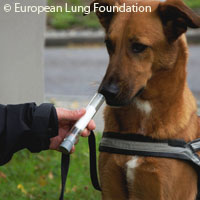Sniffer dogs and lung cancer detection? Study shows it's possible!
Can the power of scent be used to detect cancer? A new study from Germany, presented in The European Respiratory Journal, has found that sniffer dogs can help physicians make early yet reliable detections of lung cancer in patients. It is the first study to ever make this discovery. Lung cancer ranks second in Europe in terms of frequency of the disease in both men and women. It is the most common cause of death from cancer on a global scale; studies show that more than 340 000 people die from lung cancer every year. Experts point out that early detection of this disease is not easy, and lung cancer is not strongly associated with any symptoms. Existing methods to detect lung cancer are not reliable; on the whole, research has focused on the use of exhaled breath specimens from patients for future screening tests. Researchers at the Schillerhoehe Hospital in Germany say the current methods depend on identifying volatile organic compounds (VOCs) that are linked to the presence of cancer. While a number of varied technological applications have been developed, the methods cannot yet be applied in a clinical setting because patients are not able to eat or smoke before the test. Sample analysis is also a time-consuming process and the risk of interference is high. As a result, researchers have been unable to identify lung-cancer-specific VOCs to date. In this study, the researchers investigated whether a VOC in the breath of patients could be identified by sniffer dogs. The team used dogs trained specifically for this purpose, to assess participants that included lung cancer patients, chronic obstructive pulmonary disease (COPD) patients and healthy volunteers. Could the dogs reliably identify lung cancer in patients? Based on the several tests performed, the dogs succeeded in identifying 71 samples with lung cancer out of a possible 100. The dogs also detected 372 samples without lung cancer out of a possible 400. The team says the dogs could also detect lung cancer independently from COPD and tobacco smoke. It should be noted that the researchers also observed if the results were found with the presence of tobacco. The findings also confirmed the presence of a stable marker for lung cancer that is independent of COPD and is also detectable in the presence of tobacco smoke, drugs and food odours, according to the researchers. Commenting on the results, lead author Thorsten Walles at Schillerhoehe, says: 'In the breath of patients with lung cancer, there are likely to be different chemicals to normal breath samples and the dogs' keen sense of smell can detect this difference at an early stage of the disease. Our results confirm the presence of a stable marker for lung cancer. This is a big step forward in the diagnosis of lung cancer, but we still need to precisely identify the compounds observed in the exhaled breath of patients. It is unfortunate that dogs cannot communicate the biochemistry of the scent of cancer!'For more information, please visit:Institute for Plant Protection of the National Research Council (IPP-CNR) in Florence:http://www.ipp.cnr.it/en/home.html
Countries
Germany



